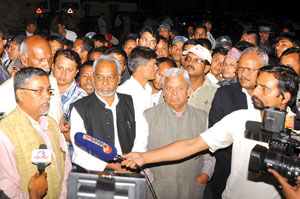 |
The Maoist-led government made progress in the peace and constitution process in its first 100 days, but the honeymoon was overshadowed by corruption of epic proportions involving ministers and law makers.
Barring their notorious role in pardoning their own war criminals and hijacking the state exchequer, the Maoists have done fairly well. Despite pressure from within, Prime Minister Baburam Bhattarai ensured that integration went ahead and got the State Restructuring Commission up and running.
Alas, the same can't be said about his Madhesi partners in government. They may not have a monopoly on malfeasance, but the energy with which they have been emptying the state coffers, sheltering crooks and demanding payoffs for transfers is breath-taking. These are the same leaders who once gave passionate speeches about how they would work to right the historical wrongs against the Madhesi people.
Despite a Madhesi minister holding the powerful home and defense portfolios, the law and order situation in the Tarai has gone from bad to worse, thanks to gangster-style micro-managing. From kickbacks in irrigation projects to transfers of police personnel and tax officers, Madhesi leaders in this government have reinforced the stereotype of what everyone expected of them. Public dissatisfaction with their own leaders in the Madhes itself is at an all time high.
Suddenly, the leaders are rushing down for unscheduled visits to Biratnagar, Birganj and Janakpur and, in a bizarre mix of irony and idiocy, calling on their own government to implement agreements which they had forgotten for the last 100 days.
The electoral games have begun, and the Madhesi parties are well aware that the three main parties are trying to steal away their votes in the Tarai. However the Madhesi Front, which claims to be the 'Fourth Force' of Nepali politics, has been shocked by its diminishing clout in New Delhi and dipping popularity in the plains.
In their meeting with PM Baburam Bhattarai and Pushpa Kamal Dahal this week, the Madhesi Front warned the leaders of "the next Madhes movement". Yet with credibility in the Madhes at an all time low, this is an attempt to rouse a thoroughly disillusioned constituency back home. A Front meeting this week degenerated into ugly blame throwing, and an insider told us the leaders were especially critical of Home Minister Bijay Kumar Gachhedar and blamed him for disgracing Madhesi politics. They instructed Gachhedar to either do what he was sent to do or step down.
Sadbhavana leader and Health Minister, Rajendra Mahato admitted on BBC Nepali this week that the performance of his colleagues was below par. "We will have no face to show to the Madhesi people if we fail to deliver even from a government in which Madhesis hold all major portfolios," he said. The corruption cases against JP Gupta and Hridyesh Tripathi, the more articulate among Madhesi leaders, has left the Madhesi politics at the mercy of those that are neither doing any favour to their own party nor the constituency they represent.
The Madhesi parties have wasted precious time bargaining for something that their own people have rejected. They must now listen to them before raising the 'One Madhes' slogan. The Madhes movement was one for inclusion and dignity, not for an exclusive identity. The demand for inclusion of Madhesis in centers of power: politics, bureaucracy and the army calls for a closer integration of the region and its people into the national mainstream.
In a recent tv interview, JP Gupta said that more than anyone else, the people of Madhes would be the biggest losers if the constitution is not drafted. Let's hope that the Madhesis are looking to do just that in the coming days.
Related columns:
Cock-fight, #559
The anger in the Madhes this time is against Madhesi leaders themselves
Wounds that won't heal, #565
The fact that we have two Madhesis as the heads of the state doesn't mean we live in a multicultural republic.
Read also:
When Wen?
Justice is peace, RUBEENA MAHATO
War is often only a few miscarriages of justice away



